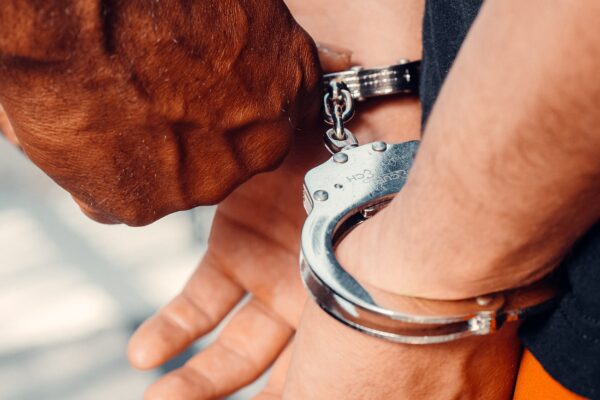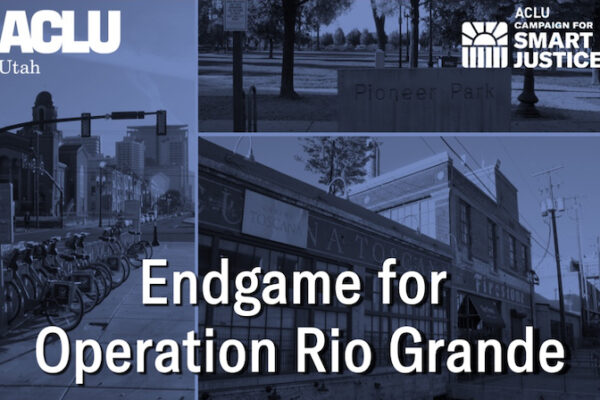FOR IMMEDIATE RELEASE
September 19, 2017
ACLU of Utah Statement on Operation Rio Grande (UPDATED)
SALT LAKE CITY, UT — The ACLU of Utah has been asked by several community partners and ally organizations to share our evaluation of the constitutionality of the on-going, multi-agency Operation Rio Grande.
After five weeks of implementation activity under the umbrella of this operation, the ACLU of Utah has seen very little to change our original assessment of this law-enforcement-heavy effort as “business as usual.” Now somewhere between the second and third phase of implementation, this operation appears to rely on simply more of the same ineffective attempts to control the complex social issues of poverty, substance use disorder and mental illness through the same traditional mechanisms of our broken criminal justice system.
Operation Rio Grande remains primarily law-enforcement focused, with multiple law enforcement agencies involved in a dramatic “clean up” of this small area of downtown Salt Lake City, at great expense to taxpayers statewide. Treatment and other supportive services have been secondary considerations in the implementation of this operation.In the rush to launch Operation Rio Grande, several critical constitutional concerns appear to have been either overlooked or disregarded.
Specifically, Operation Rio Grande leaders have touted over 1,000 arrests in the area in five weeks. This influx of defendants and new criminal charges have created significant pressure on the Salt Lake County Legal Defender Association. Operation Rio Grande has caused caseloads for public defenders in Salt Lake County to spike to levels recognized as constitutionally-problematic by the American Bar Association.
The Salt Lake County LDA is arguably the best-funded and most professionalized county-based public defender system in the state of Utah (which has consistently rated at the bottom of the barrel, nationally, for funding and oversight of public defense). To cope with the deluge of new cases initiated under this operation, Salt Lake County LDA requested a $368,000 grant from the relatively new Indigent Defense Commission. This grant was approved by the Indigent Defense Commission on September 8, 2017, several weeks into Operation Rio Grande, and we anticipate that several more weeks will pass before additional defense attorneys will be hired.
The Sixth Amendment right to counsel has been compromised for hundreds of individuals arrested during these initial weeks of Operation Rio Grande. We are also concerned that funding appropriated primarily to support struggling, rural, county public defender systems has instead been spent defending new prosecutions in Salt Lake County that previously had not been public safety priorities.
We are heartened to see new treatment beds funded by the state, and are supportive of the additional Drug Court established within Salt Lake County. We sincerely hope that both efforts will persist beyond the life of Operation Rio Grande, as the need is great. The agencies engaged in Operation Rio Grande have made good faith efforts to establish treatment options for some individuals arrested as part of the operation. We are troubled, however, that to create space at the Salt Lake County Jail, the in-jail treatment protocol of many incarcerated individuals was disrupted, as participants in the CATS substance abuse treatment program were moved mid-treatment to other county jails with questionable continuity of treatment.
It appears that a small portion of Rio Grande Street, about one-half block between homeless service provider buildings, may be closed on a short-term basis for stated public safety purposes. There is always a concern when the government considers closing a space that is a public forum for activity and expression. We appreciate the City's sensitivity to constitutional concerns, and the collection of public feedback. There are some circumstances where a temporary closure could be appropriate, when the government can articulate clear public safety concerns.
If done, the partial street closure should be done as narrowly and carefully as possible. The Governor has announced that he will convene a Special Session of the Legislature this week to discuss legislation that would change state law regarding when and why the government can close public streets. No draft legislation has been shared with the ACLU of Utah, and we have participated in no street closure discussions since the week of the launch of Operation Rio Grande. We remain concerned that legislation could be structured too broadly for adequate protection of First Amendment rights, or could be applied in future situations where minimal public safety concerns are involved.
The ID card proposal linked to this street closure continues to cause much concern for the ACLU of Utah. The state’s Department of Workforce Services is currently administering a “voluntary” assessment to individuals who visit the Community Connections Center and who exit the Salt Lake County Jail after being booked for an Operation Rio Grande-related arrest. Individuals who are administered this assessment sign a consent form, with the understanding that their information will be collected in a state database and that consent will enable them to access various homeless services. At the time of the assessment, a photo is taken for identification and fingerprints are collected.These individuals are told that they will eventually be given an ID card that features their photo and, possibly, their fingerprints. The ID cards are not yet available, though the assessments are being conducted and data is being collected and stored.
The information collected by the state is not currently connected to any homeless service providers. The short-term Department of Workforce Services database of information is not connected to any other informational databases, including those maintained by the state, those maintained by individual service providers, or those maintained by law enforcement. By participating in the assessment and providing personal biometric information, individuals gain no actual access to services at this time. We are concerned about whether consent in this instance can be truly informed. Additionally, we remain concerned that this information could be shared with law enforcement agencies, used to deny services to needy individuals, or requested by law enforcement officers during in-community interactions in the Rio Grande neighborhood.
Residents of nearby neighborhoods have noted that some individuals experiencing homelessness have merely moved from the Rio Grande area and are now camping in surrounding areas. From a constitutional perspective, the diffusion of this vulnerable population is less problematic than the large-scale incarceration of other members of this population who have simply been relocated to the Salt Lake County Jail. Nonetheless, it appears that individuals who are camping in other areas are experiencing similar levels of law enforcement interaction as has been customary in the Rio Grande neighborhood in the past five weeks. These individuals are also now located farther from services designed to assist them. This distance could become life-threatening as temperatures begin to fall.
Finally, the ACLU of Utah continues to receive complaints about perceived law enforcement harassment in the Rio Grande area. Residents, visitors and even service providers report being asked by officers to justify their presence in the area. Some individuals report being verbally harangued by officers about their appearance and/or their activities.
###
Related Content

ACLU of Utah Statement on Operation Rio Grande
Stay Informed
Sign up to be the first to hear about how to take action.
By completing this form, I agree to receive occasional emails per the terms of the ACLU’s privacy statement.
By completing this form, I agree to receive occasional emails per the terms of the ACLU’s privacy statement.

